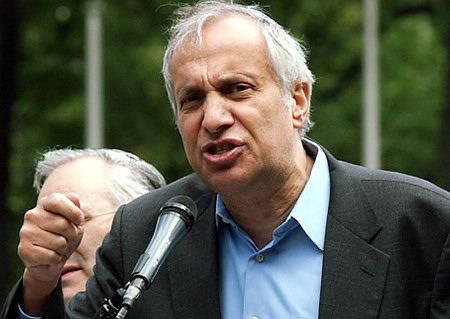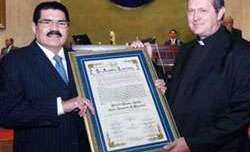Although a slander suit against Polish Cardinal Jozef Glemp was dismissed by a judge last week, Rabbi Avi Weiss vows that he will not rest until the cardinal apologizes for remarks made in 1989, which Weiss claims injured his reputation and were anti-Semitic.
Last week’s decision by U.S. District Court Judge Robert Patterson was the latest setback for the Bronx, N.Y. rabbi, who has clashed with the head of Poland’s Catholic Church in the courts and in the media since 1989.
 Ironically, while the slander case has attracted a great deal of media attention, an ongoing dialogue between Jews and Polish Catholics has been quietly successful.
Ironically, while the slander case has attracted a great deal of media attention, an ongoing dialogue between Jews and Polish Catholics has been quietly successful.
Rabbi Weiss’ claims of slander arose from an incident in July 1989, when he and six other Jews scaled the walls of a Carmelite convent in Auschwitz, Poland, to protest its presence near the site where the Nazis killed hundreds of thousands of Jews during World War II.
In an August 1989 homily after the incident, Cardinal Glemp urged people not to call the protesters “heroes.” He suggested that, had they not been stopped, they might have killed the nuns living at Auschwitz.
Two Polish courts later rejected Rabbi Weiss’ claim that the sermon “caused serious harm” to his reputation. As the highest Catholic official in the land, the courts concluded, Cardinal Glemp had the right to speak in defense of the sisters, whose rights had been violated by Rabbi Weiss’ illegal raid on the convent.
Rebuffed in Poland, Rabbi Weiss filed his lawsuit in New York last fall. He tried to serve legal notice of the suit on Cardinal Glemp outside of the Cathedral of the Immaculate Conception here in Albany last September during the cardinal’s 14–city, three–week tour of America.
In dismissing the suit, Judge Patterson concurred with Cardinal Glemp’s U.S. attorneys that the rabbi’s process server had failed in her attempt to deliver the court summons to the cardinal in Albany. However, in his 39–page decision, issued March 18, Judge Patterson denied the cardinal’s additional request that the case be dismissed on the grounds that Rabbi Weiss had no standing to sue him in U.S. courts. That decision has left open the possibility that Rabbi Weiss might be able to file suit again if the cardinal ever returns to America.
Rabbi Weiss’ lawyer, well–known Harvard professor Alan Dershowitz, indicated Rabbi Weiss will not give up despite the recent setback. During a telephone interview, Dershowitz accused the judge of issuing a “very one–sided opinion” and applying “a double standard for a cardinal.”
Dershowitz, who said he would appeal the decision, added, “In 28 years of practicing law I have never seen a case where service of process was not routinely found to have been made.”
‘Intentionally False’ Testimony
But Judge Patterson found plenty that was not routine about the rabbi’s process server during a dramatic, day–long hearing Feb. 11 in his Manhattan courtroom. The judge decided that Rabbi Weiss’ two process servers—Aline Frisch and Renee Lewis—had made “intentionally false” statements to the court.
Frisch, it was revealed, used to belong to Rabbi Weiss’ New York synagogue; her husband is still a member. She testified that she confronted the cardinal in Albany and, “in a loud clear voice, announced: ‘Cardinal Glemp, I am an officer of the court. I have legal papers for you.’”
Someone, possibly the cardinal, replied, “No, no,” she recalled, and she tucked the papers under the cardinal’s arm. A priest in the cardinal’s entourage—whom she identified as Father Randall Patterson, chancellor of the Albany Diocese—swatted the papers to the ground and later picked them up, according to her testimony.
Her story, and that of her colleague, Renee Lewis, was shaken badly during cross–examination by Cardinal Glemp’s lawyers, Kevin Baine and Kevin Hasson.
Frisch left the courtroom in tears. And Lewis was obviously flustered as she admitted that she could not explain why her sworn statement in the case was almost identical, word for word and paragraph for paragraph, to Frisch’s affidavit.
Cardinal Glemp’s lawyers also produced outtakes of news footage of the cardinal’s visit, obtained from an Albany television station. The videotape, played in the courtroom, showed Frisch mumbling an indecipherable phrase and pushing the court papers toward the cardinal. The tape showed that the papers were blocked by Father Patterson and fell to the ground without ever touching the cardinal.
‘Chutzpah’ Contradition
In addition to the process servers’ “intentionally false” testimony, Judge Patterson said that he was troubled by “discrepancies” in testimony given by Dershowitz about his meeting with the Polish judges who had dismissed Rabbi Weiss’ suit.
In an affidavit, Dershowitz claimed that the judges admitted to him “in clear and unambiguous terms that they were under enormous pressure to dismiss the case” against Cardinal Glemp. But, as Judge Patterson pointed out, that is not how Dershowitz described the meeting in his recent best–selling autobiography, Chutzpah. In his book, Dershowitz says only that, “After we left the courthouse, pressure was obviously placed on these judges.”
Despite having been defeated again in court, Dershowitz vowed that he and Rabbi Weiss would continue their fight. The judge “ruled that we can sue Cardinal Glemp the next time he comes here,” Dershowitz said. “So it’s a Sword of Damocles hanging over his head until and unless, he apologizes.”
But even as Rabbi Weiss and his attorney are plotting the next move in their campaign against the cardinal, the real work of rebuilding Catholic–Jewish relations in Poland is continuing quietly, behind the scenes, five months after Cardinal Glemp’s visit to America.
During that trip, the cardinal invited American–Jewish leaders to continue their dialogue with him in a series of meetings in Poland. The first such meeting took place last month, with all sides agreeing that it was a success.
Also, construction continues on a new convent for the Carmelites of Auschwitz. By year’s end, they hope to be settled in their new home, which will also house the Catholic Center for Meeting, Reconciliation and Prayer.
According to Rabbi Byron Sherwin, academic vice president at Spertus College of Judacia in Chicago—the only Jewish institution that Cardinal Glemp visited while in the United States—the ongoing lawsuit has tended to obscure the slow but earnest progress that Cardinal Glemp and other Catholic officials are making in Poland.
Despite the Rabbi Weiss controversy, there is a cause to be hopeful for the interreligious future of Poland, Rabbi Sherwin indicated. Noting that before the Nazi holocaust, nearly nine of every ten Jews in the world lived in Poland or traced their roots back to there, he concluded: “When you think about it, the Poles and Jews have a thousand years of common history, which is not true of hardly any other country.”
Originally published in Our Sunday Visitor (April 5, 1992)
© David Scott, 2005. All rights reserved.


